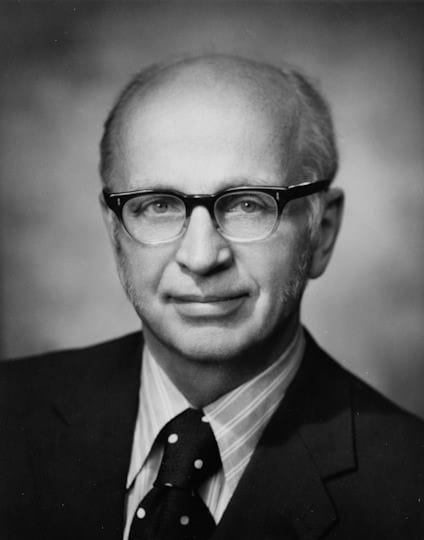
A Phi Beta Kappa graduate of Harvard College and an Alpha Omega Alpha graduate of Harvard Medical School, Dr. Daughaday completed his internship and research fellowship at Boston City Hospital. He came to St. Louis in 1947 as an “assistant resident” in medicine at Barnes Hospital. Following a research fellowship with Nobel laureates Gerty and Carl Cori, Dr. Daughaday joined the faculty and became the first director of the Metabolism Division (now the Division of Endocrinology, Metabolism and Lipid Research) in 1951. Rising to the rank of Professor of Medicine in 1963, Dr. Daughaday was the founding director of Washington University’s Diabetes and Endocrinology Research Center (1975) and its successor (1978), the Diabetes Research and Training Center (DRTC). In 2008, the DRTC was in its 31st year of research funding. In 1983, he was named the first Irene E. and Michael M. Karl Professor of Endocrinology and Metabolism, an honor later bestowed upon his successor as division chief, Dr. Philip Cryer. After 47 years of dedicated service to students, residents, postdoctoral fellows and faculty, he retired from Washington University in 1994.
A rigorous scientist, Bill Daughaday set equally high standards for himself as well as his research fellows and faculty. His own original scientific contributions were substantial. Among them was his discovery of the insulin-like growth factors, his discovery of corticosteroid binding globulin, his early development and application of growth hormone and prolactin radioimmunoassays, and his discovery of “big” IGF‑II as a cause of nonislet cell tumor hypoglycemia. Bill was also highly respected clinician and teacher who was proud of training several generations of outstanding endocrinologists. As chairman of the American Board of Internal Medicine’s subspecialty panel in 1972, he authored (with the help of junior faculty member Louis Avioli, M.D.) the first certifying examination in endocrinology and metabolism.
Dr. Daughaday served NIH as a member of the Endocrine Study Section as well as the NIDDK Advisory Council, and the FDA as chair of its Endocrinology and Metabolism Advisory Committee. He was the editor of the Journal of Laboratory and Clinical Medicine and the Journal of Clinical Endocrinology and Metabolism, associate editor of the Journal of Clinical Investigation, and a member of several editorial boards.
Dr. Daughaday’s numerous scientific honors included the Fred Conrad Koch Award of the Endocrine Society (which he served as President), election to membership in the American Society for Clinical Investigation and the Association of American Physicians, and his election to membership in the National Academy of Sciences in 1987.
Washington University recognized the many contributions of Dr. William H. Daughaday with its 2nd Century Award in 1993.